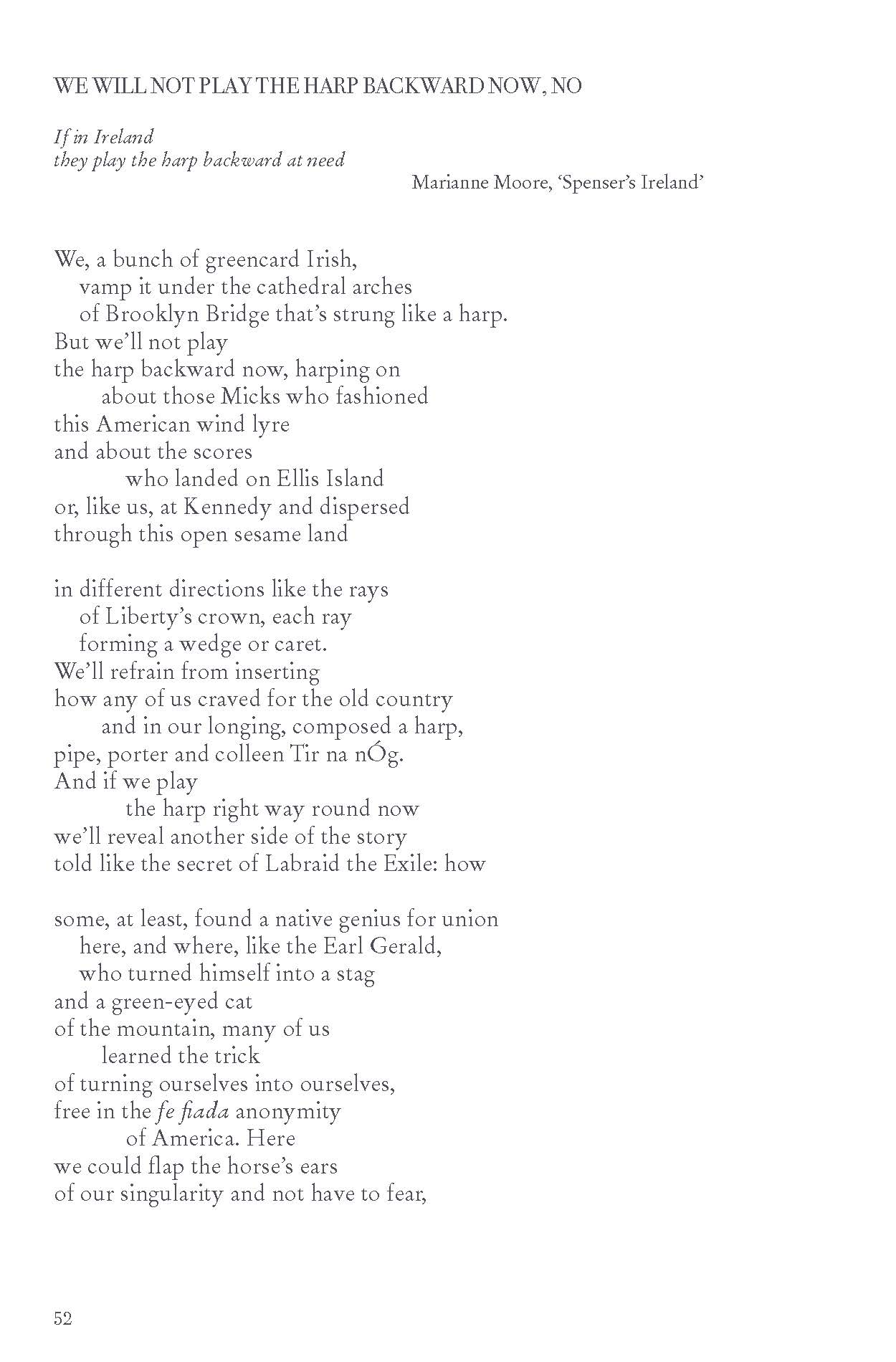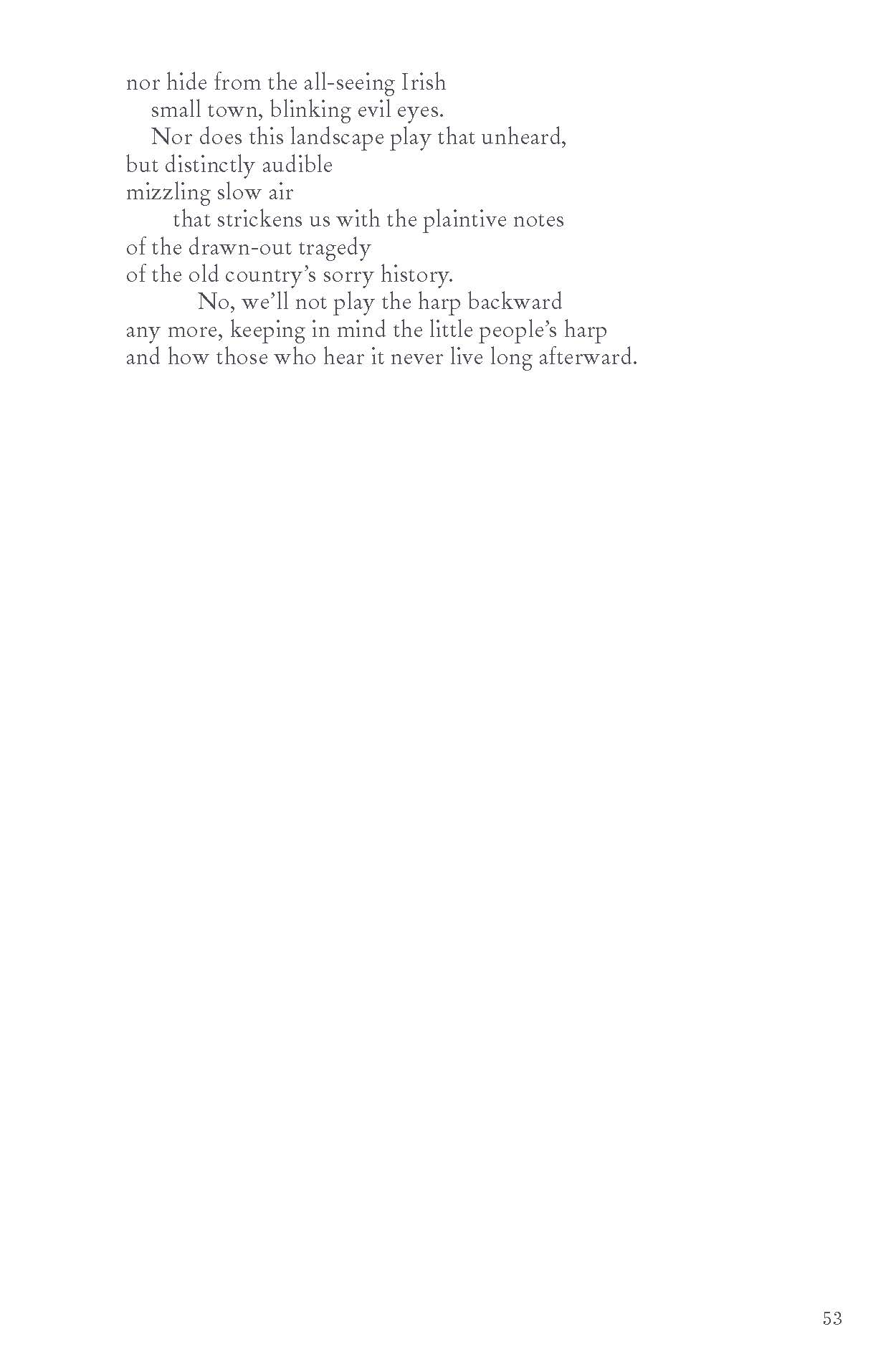We, a bunch of greencard Irish,
vamp it under the cathedral arches
of Brooklyn Bridge that’s strung like a harp.
‘We Will Not Play the Harp Backward Now, No’ Selected Delanty p. 52
A Textbook of Irish Literature (Part II.) by Eleanor Hull (Dublin, M. H. GILL & SON, LTD. & London, DAVID NUTT., 1908) follows a preface with a chronology which begins with Fear Flatha Ó Gnímh.
fl. 1560. FEARFLATHA O’GNIVE, bard of the O’Neills of Clannaboy, accompanied Shane O’Neill to London in 1562, when he was summoned by Elizabeth. His poems had much influence in rousing O’Neill to action in the North, and in stirring up the Irish nobles in other parts of the kingdom. His best known poem is the “Downfall (or ‘stepping~down’) of the Gael,” a lament over the condition of Ireland and the inaction of the chiefs. This O’Gnive, or more probably another bard of the same name, wrote a lament on the death of Teigue Dall O’Higgin, who was murdered in 1617 by the O’Haras.
Downfall of the Gael
My heart is in woe,
And my soul deep in trouble,—
For the mighty are low,
And abased are the noble:
The Sons of the Gael
Are in exile and mourning,
Worn, weary, and pale
As spent pilgrims returning;
Or men who, in flight
From the field of disaster,
Beseech the black night
On their flight to fall faster;
Or seamen aghast
When their planks gape asunder
And the waves fierce and fast
Tumble through in hoarse thunder;
Or men whom we see
That have got their death-omen,—
Such wretches are we
In the chains of our foemen!
Our courage is fear,
Our nobility vileness,
Our hope is despair,
And our comeliness foulness.
There is mist on our heads,
And a cloud chill and hoary
Of black sorrow, sheds
An eclipse on our glory.
From Boyne to the Linn
Has the mandate been given,
That the children of Finn
From their country be driven.
That the sons of the king—
Oh, the treason and malice!—
Shall no more ride the ring
In their own native valleys;
No more shall repair
Where the hill foxes tarry,
Nor forth to the air
Fling the hawk at her quarry:
For the plain shall be broke
By the share of the stranger,
And the stone-mason's stroke
Tell the woods of their danger;
The green hills and shore
Be with white keeps disfigured,
And the Mote of Rathmore
Be the Saxon churl's haggard!
The land of the lakes
Shall no more know the prospect
Of valleys and brakes—
So transformed is her aspect!
The Gael cannot tell,
In the uprooted wildwood
And the red ridgy dell,
The old nurse of his childhood:
The nurse of his youth
Is in doubt as she views him,
If the wan wretch, in truth,
Be the child of her bosom.
We starve by the board,
And we thirst amid wassail—
For the guest is the lord,
And the host is the vassal.
Through the woods let us roam,
Through the wastes wild and barren;
We are strangers at home!
We are exiles in Erin!
And Erin's a bark
O'er the wide waters driven!
And the tempest howls dark,
And her side planks are riven!
And in billows of might
Swell the Saxon before her,—
Unite, oh, unite!
Or the billows burst o'er her!
Archie Burnett in his introduction to Selected Delanty:
"The words for people who change their country are themselves highlighted as strange, foreign:
I ate the lotus of emigration,
never in a decade of Sundays imagining I’d be here
to stay, wincing at the word emigrant
that, once uttered, seems to filch me of myself
the way they say a camera steals a soul.
And there is that stranger word immigrant
that I’ve become and that my tongue
that night stuck on, the stammer itself
intimating the meaning.
‘The Lost Way’ p. 48
Brand us exiles, emigrants if you like.
‘To Those Who Stayed’ p. 228
For all that, there is an undeniable impulse in the poems to look back to Ireland, to name the old names of the streets and people, to bring to life the colorful detail of domesticity and childhood...."
And as in the earliest of Irish verse
The Gael cannot tell,
In the uprooted wildwood
And the red ridgy dell,
The old nurse of his childhood:


Pádraig Dall Ó Beirn (c. 1794 – 8 April 1863)

